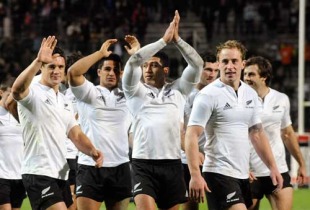|
Comment
All Blacks back out in front
Huw Turner
December 1, 2009

New Zealand were comprehensive winners over France
© Getty Images
Enlarge
The All Blacks' commanding performance against the French in Marseille was a triumph for coach Graham Henry and his assistants, Wayne Smith and Steve Hansen. Following a decidedly average 2009 Tri Nations, there were persistent and widespread calls in New Zealand for the trio to be replaced in advance of the 2011 Rugby World Cup. Henry's response, a reshuffling of the coaching responsibilities of his group, was widely derided, and may have had more to do with public relations than coaching realities. Whatever the truth, acerbic criticisms involving mention of deckchairs and the Titanic can now be tossed overboard. Henry and co will be impossible to dislodge this side of the World Cup on the evidence of this northern autumn. This Test was widely regarded as the defining contest of a largely unforgettable series of matches involving the Tri and Six Nations. The French seemed to be in the ascendancy, their physicality and athleticism having been too much for the Springboks and likely to pose a real challenge to the All Blacks, recently re-installed as the world's top ranked rugby side according to the IRB World Rankings. As happened earlier in the day in Cardiff, where a feeble Welsh effort was comfortably brushed aside by a mentally hardened Wallabies side, the French were never a match for the All Blacks, they were never in the game. Against the Boks, back-rowers Louis Picamoles and Imanol Harinordoquy were more than a match for their opponents in the vanguard of the French forward effort. Both injured and therefore missing in Marseille, Julien Bonnaire and Fulgence Ouedraogo were no match for the All Black trio of Kieran Read, Richie McCaw and Jerome Kaino. There the Test was effectively won and lost. So two years out from the next World Cup, the All Blacks find themselves in familiar territory, the best side in the world but having to shoulder the expectations that go with that. So, who are the players who have made the most of their opportunities on this tour? Conrad Smith has established himself at the core of the All Blacks' midfield offensive and defensive strategy. A wonderful organiser and positional player, he is deceptively fleet of foot and can always be relied on to take the right option and make the most of any given situation. Much the same can be said of Cory Jane, fullback cover for Mils Muliaina and clearly now a first choice winger on the right flank. His emergence throughout 2009 has coincided with the decline in Joe Rocokoko's form and the Auckland winger was not missed such was the quality of Jane's work. Zac Guildford is only 20 but he made eye-catching appearances in Cardiff and at Twickenham and will be peaking come 2015. Amongst the forwards, Brad Thorn is owed a huge debt of gratitude by Henry. Unlikely to be around in 2011, Thorn played in every test match in 2009, his performances in the engine room holding the All Black pack together. Tom Donnelly made huge strides in recent weeks, holding off the challenge of the fit-again Anthony Boric. With Chris Jack available once more , Ali Williams recovering from injury and Isaac Ross bulking up back in New Zealand in readiness for 2010, the All Blacks' apparently depleted second-row reserves are on the verge of replenishment. In the interim Thorn has held it all together, mentoring the inexperienced and buying time for those injured or currently unavailable. Canterbury's Read has displaced Rodney So'oialo on this tour and the old warrior will find it difficult to reclaim his place. He seems to have lost the abrasive edge which made him such a formidable competitor and while Read offers something different, more of an option at the lineout in particular, he matches the Wellingtonian for athleticism. With two years still to go, it seems premature to speculate in too much detail about the All Blacks' World Cup prospects. Despite the many positives to have come from this tour, there is still the feeling that in Dan Carter and McCaw they have two all-time greats without whom their chances would be greatly reduced. But, as this tour has shown, with or without Carter and McCaw the All Blacks retain that precious mental edge, that priceless knowledge about winning. Seemingly up against it in the South of France, a rugby fortress if ever there was one, it was possible to sense in their demeanour, in the reports coming back about their preparation in training, that they would find the reserves of mental strength and footballing intelligence to prevail. And so it proved. © Scrum.com
|
Live Sports
Communication error please reload the page.
-
Football
-
Cricket
-
Rugby
-
- Days
- Hrs
- Mins
- Secs
F1 - Abu Dhabi GP
Abu Dhabi Grand Prix December 11-131. Max Verstappen ()
2. Valtteri Bottas (Mercedes)
3. Lewis Hamilton (Mercedes)
4. Alexander Albon ()
5. Lando Norris ()
6. Carlos Sainz Jr ()
-
ESPNOtherLive >>
Snooker - China Open
Tennis - Miami Open

